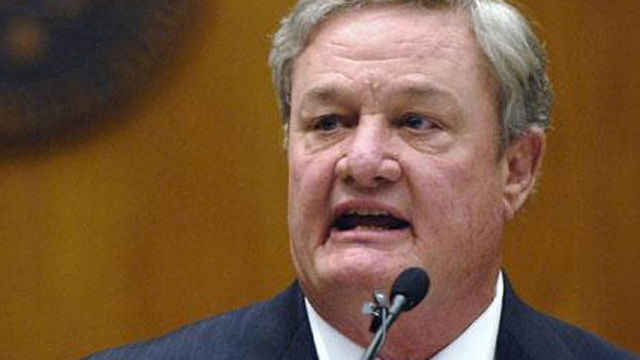Dalrymple Is A Poor Leader On Higher Education

Governor Jack Dalrymple can be a frustrating person when it comes to higher education. For one thing, he’s rarely visible taking a leadership role on the issue despite one scandal after another which has diminished the public’s trust in the institutions. For another, Dalrymple seems intent on enabling the status quo at the universities.
A status quo that is serving neither the state nor the students all that well.
For instance, Dalrymple recently vetoed legislation which would have put a stop to excessive “golden parachute” severance packages for university employees (believe it or not, former Chancellor Hamid Shirvani is still on the state’s payroll and has even been getting raises). And take a gander at this question between Dalrymple and the Grand Forks Herald editorial board.
Asked if he felt the university system was going to improve its relationship with the Legislature and get better at being transparent with the public, Dalrymple said the real issue is finding a chancellor the university presidents like:
Q. Do you have hope there will be improvements as far as transparency with the university system and a less contentious working relationship with lawmakers?
I am optimistic. I think it will happen. I think we had an interview process that was hyper-aware of that, and I think the candidates were hyper-aware of the situation. I think this new guy knows what needs to be done and will be very conscious of transparency and process.
I really think they’ll do better. The whole thing about it really is the relationships. Legislators spend all their time talking about what’s the process and what are the roles and who’s in charge of this and that, but really, our problem has been just the relationship between the chancellor and the presidents. That’s critical.
It’s like anything. You have to have a relationship with the people you are administrating and without that, no system is going to work well.
You have to wonder who Dalrymple thinks is really in charge of the universities. Is it the State Board of Higher Education and the Chancellor they hire? Or is it the university presidents? That’s an important question, because right now our university system isn’t being run as a system so much as a loose confederacy of rival institutions.
Dalrymple seems to want a leader for the universities who will enable that status quo rather than one who will shape it into something better.
Oh, and how about the universities using tax dollars intended for academic scholarships for football players? According to Dalrymple, there’s no such thing as an athletic scholarship.
Q. Regarding the state’s Challenge funds (which match donations to the universities’ endowments), did the Legislature put tighter restrictions on the athletic scholarship end of that?
They did, finally. It was kind of silly because we don’t, as a system, restrict or put athletes in a different category. These are academic scholarships. They are for students to get an education and a degree. Whether the person is an athlete or not may enter into the admission process or recruiting process, but in the end, it is an academic scholarship.
So, why would we have a different standard for the Foundation Scholarship than we have for the system itself?
But once the legislators got talking about that, it kind of took on a life of its own. That’s OK, because they will need all the money they have been appropriated anyway, so that’s kind of a side discussion.
In the Ivy League, they like to say they don’t have athletic scholarships, period. But it just so happens that all the hockey players at Harvard wound up at Harvard—a mere coincidence.
This is patently ridiculous. Athletic scholarships exist to attract athletes to campus to play on sports teams. That’s why the NCAA regulates athletic scholarships. Nobody honestly believes that football players are getting scholarships to come to NDSU, as an example, to enhance the academic atmosphere there.
They are there to enhance the athletic teams. That they also get an education is beside the point.
For those of you who haven’t been following this, North Dakota State University and a couple of other state institutions used matching taxpayer grants from the Challenge Fund for nearly $750,000 worth of athletic scholarships, despite the legislation limiting the use of the grants to academics.
The Dalrymple administration defended this by trying to claim that paying for athletic scholarships is an academic purpose, though clearly the Legislature didn’t agree.




